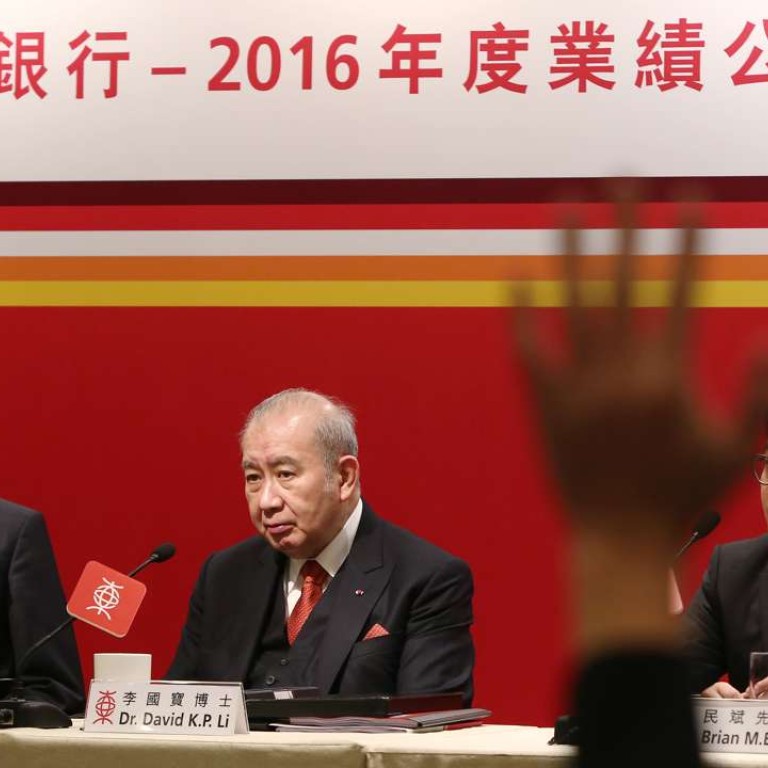
Update | BEA headcount shrinks by 10 per cent, as annual profits slump 32pc
Larger of Hong Kong’s two remaining family-run lenders making HK$700m in cost cuts, mostly in the mainland, where its posted a net loss of HK$461m
Bank of East Asia (BEA) cut more than one in ten jobs across its operations in 2016, in an effort to slash costs as its profits shrank.
The larger of Hong Kong’s two remaining family-run lenders posted annual profits of HK$3.83 billion a 32.6 per cent decline on 2015, and not much more than half the HK$6.66 billion it managed in 2014.
It is now one year into a three-year HK$700 million cost cutting programme, roughly two thirds of which will come from its mainland Chinese operations, which posted a net loss of HK$461 million for the year.
In mainland China and Taiwan, the bank reduced its headcount by 696 last year, via a process that deputy chief executive Brian Li Man-bun described as “managed attrition” rather than redundancies.
Li also said that BEA had combined nine sub branches in mainland China 2016 and had sold nine floors of its BEA tower in Beijing.
The merging of branches “is expected to continue in the first quarter of 2017”, Li said.

Alex Wong Kwok-ying, director of Ample Finance Group, said BEA’s results had failed to impress investors, who increasingly view the bank’s China exposure as negative assets.
Wong added BEA had historically focused on serving Hong Kong and overseas companies that were doing business in China, but it has been losing ground to mainland peers in recent years.
BEA first established a branch in mainland China in 1920. It was founded by the current chairman and chief executive David Li Kwok-po’s grand-father.
“First, Hong Kong capital is not as influential on the mainland as before,” Wong said. “Second, foreign companies now prefer dealing with mainland banks. They have better networks and offer lower costs for funds.”
BEA also cut its Hong Kong headcount by 677 last year, including 180 redundancies as part of the closure of its East Asia Securities branches.
Hong Kong capital is not as influential on the mainland as before...foreign companies now prefer dealing with mainland banks. They have better networks and offer lower costs for funds
BEA deputy chief executive, Adrian Li Man-kiu again described the remaining 497 job reductions as being made through “managed attrition”.
In October BEA announced the sale of its 75 per cent stake in back office service provider Tricor Holdings for HK$6.47 billion.
At the end of 2016, the bank had 10,389 staff compared with 11,768 a year earlier.
Bad loans also remain a concern for the bank, both in mainland China and Hong Kong.
In the former, its impaired loan ratio rose to 2.87 per cent, well above the average NPL ratio in China of 1.74 per cent.
The bank also chose to sell some of its non-performing loans to third parties in the second half of the year.
Brian Li said, however, that the situation was bottoming out, and cited an improvement in the bank’s special mention loans – potentially weak loans or assets presenting an unwarranted credit risk – as evidence of this.
At a group level the impaired loan ratio rose by 26 basis points to 1.49 per cent.
Adrian Li put its decline in asset quality “down to a macro slowdown in the economy as well as the renminbi volatility”.

“Most of our impaired loans are secured by assets,” he added.
BEA published its results during the lunchtime pause in stock trading in Hong Kong, and its shares then fell 2.35 per cent in afternoon trading, to close at HK$33.1.
Kingston Lin King-ham, director at AMTD securities brokerage, said some investors had priced in better results, as its shares had risen with the overall stock market over the past two months.
“This (the results) is not good news for the market,” Lin said. “If it cannot show the same improvements as other mainland banks this year, its shares will be under bigger pressure.”
In his statement accompanying the results, David Li Kwok-po, Brian and Adrian Li’s father, thanked the bank’s overseas banking partners, singling out CaixaBank and Sumitomo Mitsui Banking Corporation in particular.
BEA is currently involved in an ongoing dispute with another shareholder, hedge fund Elliott Management, in which Elliott is seeking a court order to say that BEA’s placement of new shares to SMBC and Caixa were “passed for an improper purpose.”


